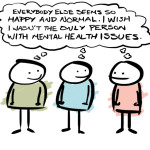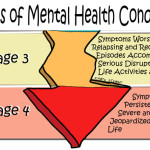
16 Ways To Improve Your Mental Health In 2013
By Lindsay HolmesThe Huffington Post
Meet your new resolution.

New Year’s resolutions often focus on improving physical health, but what if you focused on mental health this year?

While the culture at large often dismisses mental self-care, in part because of the stigma against those facing mental illness, emotional well-being is a priority for everyone: One in four people globally will experience a mental health issue at some point in his or her life.
But even if you aren’t facing an issue like anxiety or depression, focusing on your mental well-being could still make 2016 the best year yet. Mental health affects how you think, feel and act on a daily basis, as well as influences how you handle stress, make decisions and connect with others.
If you’re set on making a vow for improvement next year, add mental health to the top of your priority list. Here are some easy ways to do that:
1. Talk to your doctor.
The first initial step of any health transformation is to consult a medical professional about the appropriate steps to take. General physicians are able to offer depression screenings (in fact, some even recommend that they should be a requirement) and mental health consultations. They can then refer you to a clinician who is able to tailor to your specific needs.

2. Practice gratitude.
Life’s so much better when you’re acknowledging the bright side. Research suggests that expressing what you’re thankful for — from your dog to your favorite song on the radio — will improve your mental well-being. Looking for some suggestions? Here are 100 things many people forget to be grateful for on a regular basis.
3. Try meditation.
Meditation is no longer some New Age fad that’s too intimidating to try. The practice has a host of health benefits, from better concentration to — yep — improved mental well-being. There are multiple methods of meditation that offer varying degrees of investment. That being said, the practice doesn’t have to be complicated: Try just setting aside five minutes for meditation when you wake up or before you go to bed. You’ll likely either start or end your day on a positive note.

4. Write in a journal.Putting pen to paper can be a liberating and cathartic experience. Try keeping a journal or even just writing your anxieties and tossing them in the trash. A 2012 study found that writing what’s stressing you out and then physically throwing it away may help clear your mind. Experts also suggest writing when your worriesare keeping you up at night.
5. Go to therapy.
Speaking of therapy — do it. Seriously. Just like you’d see a doctor for a physical illness, the same standard should apply to mental illness. There are multiple methods, from talk therapy to behavioral therapy, and a mental health professional can help you figure out the avenue that works best for you.
“Talking about your issues and problems out loud can be very helpful. It gives some perspective,” Gregory Dalack, chair of the department of psychiatry at the University of Michigan, previously told HuffPost. “Talking with somebody who is trained to understand anxiety and depression can be even more helpful to help manage those symptoms, reframe some of the negative thoughts we tend to have and move us to a place [mentally] where we can cope with those difficulties.”
6. Exercise at least a few times per week.
Endorphins are magical. When you exercise, your brain releases the feel-good chemicals, giving you an instant mood boost. Additionally, try to take your workout outdoors. Research suggests group
walks (yes, walking is considered exercise) in nature can help ease depressive symptoms.
 BENZOIX VIA GETTY IMAGES
BENZOIX VIA GETTY IMAGES7. Lean on your support system.
After all, what are friends for? A 2011 study found that spending time with your BFF can reduce stress. Research also shows that social connection is imperative to mental health. Spend as much time as possible with your loved ones, whether it’s going to dinner or just watching a movie together.
8. Educate yourself.
About mental health and about the world around you, that is. Mental health conditions are much easier to manage when you know what’s really happening inside the mind. For example, did you know that some disorders may be genetic? Did you know that many conditions have physical symptoms? Learn as much as you can about what you’re dealing with or what your loved ones are experiencing.
“It’s important to get educated and empowered,” Mary Giliberti, executive director of the National Alliance on Mental Illness, previously told HuffPost. “Learn about the conditions and seek out assistance from a professional and other people.”
Additionally, keep an insatiable appetite for knowledge in general. Read a book, go to a museum or pick up a new language. Research shows continuing to learn beyond the boundaries of school can help keep your mind sharp.
9. Adopt a well-balanced diet.
Put good in, get good out. Eating well is key to overall health, including your mental well-being. Try incorporating fruits and vegetables in your diet more often along with brain-boosting foods like walnuts and spinach.
 RUNE JOHANSEN VIA GETTY IMAGES
RUNE JOHANSEN VIA GETTY IMAGES10. Listen to sad music.
Go on, sing (and listen to) the blues. Letting yourself indulge in melancholy melodies may actually help perk you up in the long run. Research shows sad songs may help you heal after a breakup. They also may prompt a few tears — which science says is good for you. One recent study found that a good cry can help boost your mood.
11. Travel.
Sometimes a change of perspective involves a change of scenery. There are many testimonies from people who have said their wanderlust has changed their life for the better. Science seemingly backs this up: Research suggests that planning a vacation can increase your overall happiness as you anticipate your trip. If you’re looking for travel suggestions, someplace with water may be a good place to start. Studies show being near the ocean can make you calmer.
12. Sleep more.
Who doesn’t love an excuse to sleep in? A lack of sleep doesn’t just wreak havoc on your physical health, but it seriously messes with your mental health. Research shows sleep deprivation can make it difficult for someone to regulate their emotions. Poor sleep is also a sign of more serious mental health problems. Try going to bed just 10 minutes earlier every night (and use one of these sleep tips if you’re feeling too anxious to drift off) and work your way up to a healthy amount of sleep.
13. Do a digital detox.
Social media is basically just a highlight reel of someone’s life — but that most likely doesn’t stop you from feeling a pang of envy every time someone posts a photo of their fabulous party, their new car or their shiny engagement ring. Research suggests that people can feel depressive symptoms from scrolling Facebook, likely due to the internal social comparison that’s taking place. The antidote? A break. Ditch those devices every so often for the sake of your mental health.
 ‘
‘
14. Express kindness toward someone else.
Want to feel good yourself? Make someone else feel good. Studies show that kindness can be cyclical. When you do a good deed for others, that makes them happier, which in turns make you happier, too. Even the smallest gesture can make a difference. Pay it forward every so often and reap the benefits.
15. Learn to say no.
It may be just two tiny letters, but this is your gentle reminder that “no” is a complete sentence. Burnout happens easily — in the office and outside of it. Make sure to spend some time alone and prioritize your well-being. If you don’t want to go to a party, don’t do it. If you feel overwhelmed by your workload, speak up. Self care is not selfish.You never know who you may be helping by opening up about your own experience. Celebrities from Demi Lovato to Colton Haynes and brave projects like documentaries and photo series have all addressed mental health issues this year alone — and our society is much better for it.
The only way our culture is going to be eradicated from the stigma of mental illness is if the conversation continues. You can be part of that change.
Here’s to 2016 being the year of you!
It may be just two tiny letters, but this is your gentle reminder that “no” is a complete sentence. Burnout happens easily — in the office and outside of it. Make sure to spend some time alone and prioritize your well-being. If you don’t want to go to a party, don’t do it. If you feel overwhelmed by your workload, speak up. Self care is not selfish.
16. Talk to others about mental health.
You never know who you may be helping by opening up about your own experience. Celebrities from Demi Lovato to Colton Haynes and brave projects like documentaries and photo series have all addressed mental health issues this year alone — and our society is much better for it.
The only way our culture is going to be eradicated from the stigma of mental illness is if the conversation continues. You can be part of that change.
Here’s to 2016 being the year of you!
Discover more from ReviewFitHealth.com
Subscribe to get the latest posts sent to your email.

 ‘
‘
